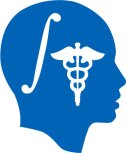 NA-MIC Project Weeks
NA-MIC Project Weeks
Overview
The Accelerating Medicines Partnership (AMP®) program is a public-private partnership between the National Institutes of Health (NIH), the U.S. Food and Drug Administration (FDA), the European Medicines Agency (EMA), pharmaceutical and life science companies, non-profits and other organizations. The overarching aim of the AMP program is to improve our understanding of disease pathways and identify new and better targets for treatment.
The AMP Schizophrenia (SCZ) program was launched in 2020 to address the critical need for more effective treatments for people with schizophrenia and related mental health conditions.
The AMP SCZ Program Approach
The aims of this 5-year $99.4 million global effort include developing tools that identify the early stages of risk for schizophrenia and predicting the likelihood of progression to psychosis and other outcomes. A related aim is to develop tools that can help researchers identify new targets for drug-based treatments that can be tested in clinical trials.
The AMP SCZ program is managed by the Foundation for the National Institutes of Health (FNIH). More detailed information about the AMP SCZ program is available on the FNIH website.
Study design
This is a non-interventional study examining clinical trajectories and predictors of outcomes in the clinical high risk (CHR) population.
Clinical assessments will be collected monthly for the first year, and then at 18 and 24 months and at the point of conversion to psychosis.
The biomarker measures (imaging, EEG and event-related potentials, fluid-based biomarkers, cognitive assessments, and speech sampling) will be collected at baseline and at two months after study entry. Digital assessments (actigraphy as well phone app-based data collection) will be collected daily for the first year. The collection of these biomarkers over time will validate their use and efficacy in the CHR population to establish early indicators of pharmacologic treatment efficacy.
Cognitive assessments will be collected longitudinally at six, 12 and 24 months and at conversion to psychosis. Unbiased machine language and AI approaches will be used to derive algorithms that predict clinical endpoints: conversion to psychosis (primary clinical endpoint); remission of the CHR state (secondary clinical endpoint), and non-conversion/non-remission (secondary clinical endpoint). These approaches will allow the selection of enriched populations to help improve success in developing pharmacologic treatments.
The goal of AMP® SCZ is to facilitate drug development for the CHR population.
https://www.ampscz.org